In a few hours, we will reach the official point where we can’t be trusted. We’ll be back on Wednesday.
Category / Personal
Runners In My Hood
On Sunday morning, I woke to the sounds of strange huzzahs. Turns out it was the San Francisco Marathon running through my hood.
The cheers came from a throng gathered at the southeastern corner of Stanyan and Haight Streets. There was a very large speaker providing music. Weird 1980s stuff like the Smiths, with a little funk thrown in for good measure. How this mix pertained to running was anyone’s guess. But I supposed it gave the runners hope, urging them to press on. I joined the folks frozen in place, cups of coffee clenched in their hands, joining in with cries of “You’re doing a great job!” and “I’m an out-of-shape bastard! You are more glorious than me!”

The above-mentioned corner crowd can be seen on the right-hand side of the frame. They were apparently gathered there for “Lorie,” but they let out enthusiasm for several people who weren’t named Lorie. It was good to see the Marathon people providing arrows. I’m sure it helped the runners. But for a spectator such as myself, I took the sign’s advice, looked up, and saw merely a foggy sky.
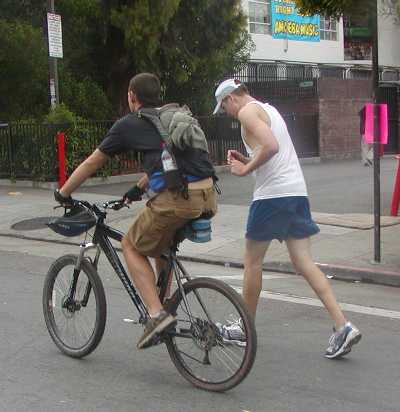
Whoever organized the biker-runner escort service was very kind. They were there by regular bicycle..
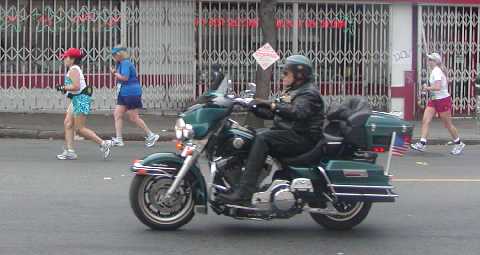
…and by motorcycle.

Strangely enough, this is one of the few times I’ve paid attention to the Milkbar during the day.
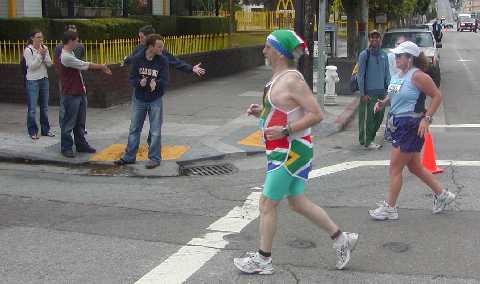
The minute that this colorful gentleman ran by, a flurry of activity occurred among some kids at the corner that involved the transaction of green pieces of paper for a green substance I couldn’t quite identify housed carefully in a plastic bag.
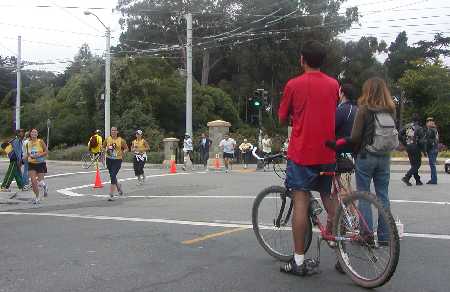
A typical assembly of frozen spectators in place. I hadn’t seen so many frozen standing people since last standing up for the Star-Spangled Banner at a ball game.
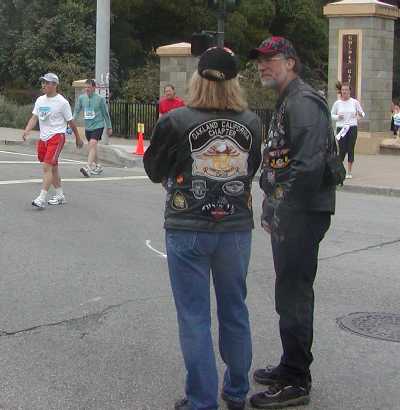
These bikers were prepared to step in if anyone did anything. I trusted them more than the cops.

This guy’s going to have a major backache tomorrow.

Aside from the cheering crowd, this gentleman raised his bear at anyone who passed by. Unfortunately, nobody paid too much attention to him, which was a shame. I suppose applause is a steadier measure than a hapless teddy.
I Need a Vacation
Okay, I fully confess (the dropoff in stats and Blogllines subscribers doesn’t lie!) that I’ve been biting the big one lately and that my posts these days leave much to be desired. (Hell, I can’t even find time for the Tanenhaus Brownie Watch.) There are reasons for this — namely, other projects and things that I’m working on, which are whittling away my wit faster than you can say summer camp.
So I’ve decided to throw in the towel for about a week or so and come back to this blog when I can offer half-decent posts again. A man’s got to know his limitations. And frankly I’m too tired and exhausted these days to offer anything intelligible about the literary world. But I’ll be back. Do visit the fine folks on the left in the meantime.
[ENTIRELY UNRELATED: In other news, it looks like Pearlstine is casting pearls before swine. Not pretty at all. About as cowardly a move as Elia Kazan, if you ask me.]
Technorati Tags: vacation, hiatus, debauchery
An Introduction
If you’re coming here from the New York Times article, welcome. This website is a dedication to the life of Edward Champion (1974-1998), who was unexpectedly beheaded by a samurai while giving a motivation speech in Chico, California. Champion was one of the most brilliant writers this nation ever had. His grocery lists were wittier than Oscar Wilde. He once wrote a note telling his friends to meet him at the pub that was exhaustively picked over by grad students. John Updike has said of the man, “Edward Champion: too many thoghts, not enough time, nipples as ripe as water chestnuts.”
And yet Champion’s work is often overlooked by the likes of J.T. Leroy, who is, strangely enough, still living.
So I set up this blog to pay tribute to Champion’s legacy. To me, Champion represents both the summit and the nadir of American letters. Some of the posts here are exhumed from Champion’s notebooks. Others are reinventions of ideas he had.
We hope that you’ll stick around for our continuing tribute.
How to Read When the Power Goes Off
Last night, at Chateau Mabuse, the power went off. We were sorry to see our pages on the computer lost into the ether. But this did, nevertheless, lead us to the romantic notion of reading by candlelight for several hours.
It proved more problematic than we expected. But since we had a few unexpected hours on our hands, we took the time to experiment and iron out the kinks. Here’s a checklist to help others plan for successful reading during a blackout:
- Have at least ten candles in reserve, but you will likely need twenty. Depending upon the health of your eyes, you’re going to need enough light to focus on the text without straining too much. Votives and tapers can put out a lot of light, particularly if the wax hasn’t burned into the telltale concave circle of use, eating into the wick’s vertical alignment. Get about six votives placed on an ample surface space in the center of the room (say, a desk or an end table moved to the center of the room) to ensure that you have enough fill light thrown upwards for general ambience. Your sitting or recumbent position should dictate the candle positioning and should allow for fluctuation in body movement (e.g., if you read the lefthand page while laying on your left side, make sure that there’s some candles on your right). Be sure to place at least four bright candles behind your general reading position to throw enough light onto the page.
- Even if you do manage to perfect a well-lighted room, you’re still going to be contending with less light than a light bulb. (When the power goes back on, the photographers or filmmakers in the peanut gallery can whip out their light meters and see that there’s a notable gap in foot candles between the two illuminated states.) So the books that you read shouldn’t be too unwieldy in weight, nor contain particularly tight typesetting or small font size. We found that a 300 page trade paperback we were reading proved to be more ideal by candlelight than Ian McEwan’s Saturday, a bulky edition of MFK Fisher’s The Art of Eating and even a Nero Wolfe mass market paperback we dug up for trial and error. The ideal book by candlelight should be something that doesn’t easily fold into itself (the mass market paperback being the most egregious offender), but that is small enough to hold without difficulty.
- Prepare yourself for the unexpected shock of the power going back on. Once we had attained an ideal reading position, the sudden whirs of appliances and various lights scared the shit out of us. Turn all your lights off and be aware of what will go on. Because if you get lost in a passage, it’s likely that the sudden climate change will make you believe that this nation is at war with yet another enemy and will take about three minutes to recover from.
- The added advantage of candles is that they smell very nice. If it is possible, try to coordinate your candle selection with scents that you find desirable. Be aware that this scent will linger, even when the power returns. Be sure that you don’t have a vanilla scent competing with a strawberry scent. None of the scents should be particularly overpowering. Likewise, none of the scents should distract you too much from the reading experience.